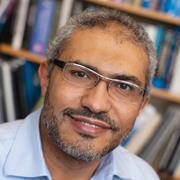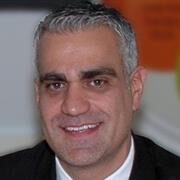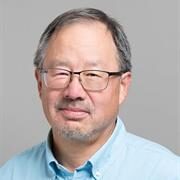Seven members of the U of T Engineering community have been elected as 2025 fellows of the Canadian Academy of Engineering (CAE). Professors Aimy Bazylak (MIE), Paul Chow (ECE), Constantin Christopoulos (CivMin), and Amer Shalaby (CivMin), along with alumni Philip Ferguson (EngSci 0T0), Ming Hou (IndE PhD 0T2), and Winnie Ye (ElecE MASc 0T2) are among the CAE’s 50 new fellows.
The CAE is a national institution through which individuals who have made outstanding contributions to engineering in Canada provide strategic advice on matters of critical importance to Canada and to Canadians.
“Through research, teaching, leadership and entrepreneurship, these exceptional faculty and alumni have had a tremendous impact nationwide in areas ranging from energy to computing to transit to infrastructure,” says U of T Engineering Dean Christopher Yip.
“On behalf of the faculty, congratulations to all our new CAE fellows.”
Our ability to mitigate climate change hinges on producing clean power while slowing the accumulation and increasing the storing of atmospheric carbon dioxide. As the Canada Research Chair in Clean Energy, Bazylak has tackled these challenges by advancing clean electrochemical energy technologies that convert renewable energy into stored fuel through water electrolysis and supply on-demand electricity through fuel cells.
She has partnered with leading automotive and energy companies to accelerate the advancement of fuel cells and electrolyzers for improved performance, efficiency and durability as zero greenhouse gas emission power and energy storage solutions. Bazylak served as Director of U of T’s Institute for Sustainable Energy and has held several leadership roles in her research community. She is a fellow of the Canadian Society for Mechanical Engineering, the American Society of Mechanical Engineers, and the Engineering Institute of Canada, and has received several research awards.
Chow has performed groundbreaking research on the use of field-programmable gate arrays (FPGAs) for reconfigurable computing, and their applications in fields from biomedicine to finance. His early work had an important impact for companies such as Intel, IBM and HP, and his later work on the use of FPGAs for computing has applications for modern data centres striving for the highest performance with the smallest power requirements
Chow co-founded two companies based on his lab’s research: AcceLight Networks and ArchES Computing Systems Corp. He also developed a novel graduate course on the design of Very-Large-Scale Integration (VLSI) systems at U of T — the first course of its kind in Canada. Chow served on the Board of CMC Microsystems for decades and was a leader in their strategic planning, as well as spearheading the creation of several large-scale research networks. He is a fellow of the Institute of Electrical and Electronics Engineers and the Engineering Institute of Canada.
Christopoulos’s research has earned him international recognition for pioneering a new approach to seismic design and earthquake engineering. He has developed several technologies to enhance the seismic resilience of structures and thus minimize the impact of natural disasters on our infrastructure. As Director of the Structural Testing Facilities, he has led initiatives to transform this lab into a world-leading facility with state-of-the-art equipment.
Christopoulos has co-founded three successful start-up companies and is a named inventor on more than 40 international patents. His work is included in the Canadian Steel Standards Association Design Code. He is also co-author of two textbooks used in undergraduate and graduate programs in multiple universities worldwide. His work has been recognized with awards from Professional Engineers Ontario and Engineers Canada, and he received the inaugural Inventor of the Year Award from the University of Toronto.
Shalaby is the Bahen/Tanenbaum Chair in Civil Engineering. He specializes in transit planning and operations, intelligent transit systems, and transportation planning for large-scale events, making significant contributions that have enriched the state of transit knowledge and practice worldwide. He has also trained many highly qualified personnel in advanced analytical methods for transit planning and operations.
Shalaby has led several research centres and institutes throughout his career. He has been an active member of multiple transit technical committees for the Transportation Research Board (TRB), and has served on editorial boards for international journals as well as advisory panels for transportation projects in Canada and globally. Shalaby is an elected fellow of the Canadian Society for Civil Engineering (CSCE). He has received several awards and honours for his research, including the TRB William Millar Award, the CSCE Sandford Fleming Award, and the ThinkTransit Award of Excellence in Innovation.
Ferguson is an associate professor at the University of Manitoba’s Price Faculty of Engineering. He is an internationally recognized aerospace engineer and researcher who has developed aerospace control and manufacturing technologies for more than 25 active aerospace products and missions, ranging from space robotics to satellites and drones. His important contributions have enabled small space systems and drones to point payloads with ten times more accuracy. His research focuses on aerospace technologies that improve system confidence, enabling widespread adoption by industry, government, academia and communities. His goal is to make aerospace remote sensing technologies more accessible to Arctic communities as climate change alters their traditional way of life.
Hou is a principal defence scientist for Defence Research and Development Canada, and an adjunct professor at UTIAS and at the University of Calgary. He is a world-renowned expert and authority in human-artificial intelligence (AI) interactions, autonomous systems and human-autonomy teaming (HAT). He has made seminal contributions to systems engineering with evolutional interaction-centered design (ICD) theory, methodology and applications in AI-enabled socio-technical intelligent adaptive systems (IAS). The paradigm-shifting ICD approach he developed is instrumental to the development of international academic IAS programs, innovative industrial IAS technologies, international HAT standards, and AI and autonomy policy and regulation frameworks for governments and for the United Nations.
Ye, a full professor in the Department of Electronics at Carleton University, is celebrated for her pioneering silicon photonics research in stress engineering, opto-electronic integration and subwavelength metamaterials. Her research excellence, community service and dedication to diversity distinguish her as an exceptional leader. A fellow of Optica and the Engineering Institute of Canada, Ye’s contributions are highlighted by prestigious honours such as the Canada Research Chair. Her leadership roles in the Institute of Electrical and Electronics Engineers (IEEE) and Optica demonstrate her commitment to advancing the field of photonics on a global scale. Her receipt of the IEEE MGA Leadership Award stands as a testament to her leadership within the engineering community.








